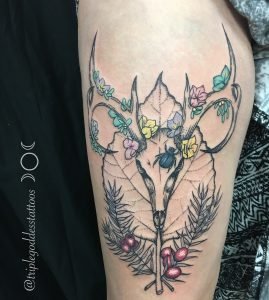Ritual Tattoos
Whether you're going on a whim or for deeply meaningful reasons, getting a tattoo is a kind of modern-day ritual: A tattoo can be a rite of passage, a revelatory experience, an affirmation of personal truths, a sign of commitment. In tattoo studios around the world, people get inked in order to express their innermost selves or to connect to something bigger than themselves.
Tattooing has a rich history that spans the globe—and it is a history firmly rooted in the concept of ritual. From tribal peoples like the Maori and Celts to highly advanced ancient civilizations like the Egyptians, tattoos were (and in some instances still are) performed with meaning and intention. Rites of passage, invocations to the gods, magical symbols of protection—all of these and more were potential reasons for getting tattooed.
The ritual element of tattooing has largely fallen away in most modern societies, especially as tattoos become more and more mainstream. But some artists are helping ritual tattoos make a comeback by offering services that focus on the intention behind the piece and the process as a whole.
Joy Shannon of Paper Crane Studio is one of those artists. She gives us her unique perspective on the renewal of this ancient practice.
Traditional Intentions
“Sometimes I wonder to myself about the classifications of tattoo styles,” Joy said when we asked what separates a ritual tattoo from a traditional one. “It's true that 'traditional' can refer to the Sailor Jerry style of old-school tattooing, but what I would say is even more traditional is the immense tribal history of tattoos. Generally speaking, traditional tattoos in tribal cultures often seemed to be created with some sort of meaningful ritual. Doing ritual tattoos is basically bringing that meaning back to the process.”
Any tattoo can be meaningful, regardless of whether or not it was done as part of a ritual. We hope at our studio that you always experience an authentic connection with your artist—but we're aware that you can sometimes get an awesome piece done by someone who don't quite vibe with. Does that take away from your tattoo's meaning? Of course not! What, then, makes a ritual tattoo particularly different?
“It's more than just a meaningful tattoo,” Joy explains. “The whole process of the tattoo is done with intention and meaningful-ness in mind.”
Each ritual tattooer has their own unique process, informed by their personal beliefs, cultural ties, and life experiences. Joy begins with a consultation in which she discusses the meaning of the tattoo. It's here that she goes over both the tattoo design and the actual tattoo session, in order to create a truly personalized experience for each client. “The session itself often consists of Reiki, or energy healing work, combined with an intention set for the tattoo. Then we do the actual tattoo, and sometimes energy work after the piece is done.”
Highly Personalized...
Just as with any other form of tattooing, the reason behind a ritual tattoo varies immensely from person to person. “Generally the pieces can be for big life transitions, new beginnings, honoring the end of an era, or a memorial tattoo for a loved one,” Joy tells us. “Some of my clients want to get a ritual tattoo experience every time they come to me, or they are working on a large multi-session piece with intention that we keep focused on every time. But I do find that clients tend to use this process for very special occasions more often than not.”
Joy is very aware of just how personal these tattoos are (which is why she never shares the details of a ritual session)—and for this reason, she maintains a very neutral approach in regard to cultural influences, despite being intimately familiar with the history of ritual tattooing. “I design the process with each client in mind and what they ask for. I never want to put anything I believe onto someone else, and I deeply respect their own personal beliefs. I feel that all cultural traditions of spirituality are describing the same life force of energy and love, so I try my best to work from that basic, neutral place.”
Whatever your beliefs or personal reasons for a ritual tattoo, you can rest assured that Joy will create an experience that is an authentic reflection of yourself and your intentions.
...and Deeply Personal
Ritual tattooing is meaningful on a personal level to Joy as the artist as well. She herself has been tattooed by by ritual Nordic tattooer Kai Uwe Faust at Kunsten På Kroppen in Copenhagen. “I am very influenced by Kai in my own work, and that tattoo is very special for me: It helps me in my own ritual tattoo work every day.”
With all of her tattoos (including non-ritual ones), Joy feels a sense of personal ritual at work: “I find that I focus myself with my own sense of intention for all of my tattoos, whether or not my client asks for me to verbally create a focus or intention for the piece I am doing. And I always set my tattooing space up like it is for a ritual tattoo, because I focus on making the space clean, comfortable, and quiet for each client. I prepare my space for what I would love to have when I get tattooed: a safe space, without judgment, with kindness and acceptance and peace. Since all tattoos are painful to some varying degree, I want to always be sensitive to each client's needs.”
Tattoos in general are demanding on a physical and mental level. Ritual tattoos can have an added intensity, vulnerability, or emotional intimacy that Joy finds can be particularly draining. “I do have to limit how many I do per day and take care of myself,” she explains, “but honestly, I feel so lucky to have the clients I do, because even when I do a light-hearted or fun tattoo without a ritual, we have the loveliest time! My ritual tattoos are especially meaningful, though, and I am so grateful for those clients' trust and openness with me. I learn so much every day from doing this professionally.”
Come As You Are
There is no special preparation that Joy asks of her clients before a ritual tattoo: Life in general has usually prepared a person for the experience, she has found. But she does stress that emotional aftercare is particularly important, in addition to proper physical aftercare. “I always tell clients, especially those who are getting memorial tattoos, to bring a loved one with them during the appointment if they need support.”
As for the physical aspect, Joy shares an interesting insight: “I have heard from some clients that the ritual tattoos heal faster or heal the best out of all their tattoos. I cannot prove this, but I love to think the energy healing work helps the body heal itself after the session.”
If you're intrigued by the concept of a ritual tattoo, please send us an email to get started. You're welcome to come in for a consultation to see if this unique offering is right for you. Whatever your background, beliefs, or intention, Joy can create a tattoo you'll love for a lifetime and an experience you'll never forget.


